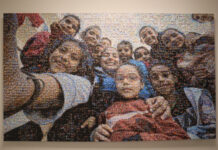On Friday, Feb. 28, right inside the College of Humanities and Social Sciences (CHASS) interdisciplinary south (INTS) 1128, three films were screened. “USA vs. Scott,” “Pretend I’m not Here,” and “This is what a Post-Roe Abortion looks like.” All three films — though made in previous years — all feel deeply relevant to the American political climate.
The Screening
“USA vs. Scott” tells the story of humanitarian activist Scott Warren as he fought for his cause in giving aid to people crossing the border. Made in 2018, this documentary-film feels like it could have been made nowadays in the way it shows how different perspectives view immigration.
“Pretend I’m not here” Is a fictional drama-film surrounding a translator. This translator stays ready on call throughout the entire night, helping to translate at a high school, hospital and police interrogation. Having been crafted with the help of University of California, Riverside (UCR) students and directed by Masters student Noah Amir Arjomand, the film deals with themes of identity, trauma, immigration and politics.
“This is what a Post-Roe abortion looks like” was the final film screened and the second film made by the keynote speaker, filmmaker Ora DeKornfeld. The film anonymously follows a woman as she explains how she was able to achieve an at-home abortion.
Ora DeKornfeld
The work made by DeKornfeld — though surrounding people whose lives are intertwined with politics — is not as inherently political as it is inherently humanist. Her style ranges from hand-held fly-on-the-wall cinematography in “USA vs. Scott,” to playful stop-motion animation within “Post-Roe abortion.”
DeKornfeld has worked with The New Yorker, The New York Times and Vox. After playing the films, DeKornfeld and Arjomand participated in a Q&A moderated by UCR Theater, Film, and Digital Production (TFDP) faculty Kristophe Katrib. Students asked her questions varying from the politics of her film, to how she was able to work with The New York Times.
Later in the day, she led a workshop on visual storytelling, giving activities to students to help sharpen their interviewing skills and learn some of the ropes when it comes to documentary filmmaking.
When asked why Arjomand thought it was relevant to program this screening at UCR in particular, he mentioned that “with the new administration, a lot of these questions about the U.S. government’s treatment of undocumented immigrants and women’s reproductive rights are just so urgent and we need to talk about them.”
DeKornfeld also wanted to stress the films relevancy to the current administration that “In the age of misinformation, when no one seems to be persuaded by fact, the only thing I can contribute to the cacophony is to tap into a feeling – what does it feel like to be this person, to live this experience?”
The thread tying all three of these films together is that they all focus on existence against all odds. In these troubling times, it is important to discover empathy for all works of life. Check out these films and reflect on what feelings they elicit.







